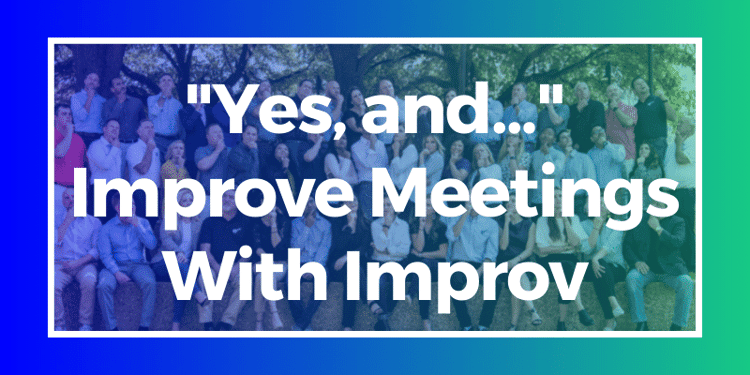
Even prior to the last 18-months of social distancing frustrations and video call exhaustion, most organizations conducted meetings that were sorely lacking in creativity, energy, and inspiration. If you take a moment to reflect on your meetings this past year (and in the years prior) how many of them felt like a wash, rinse and repeat version of every other meeting? For the most part, each of the participants in a meeting show up with their predictable patterns of engagement and the group tackles issues and opportunities with a tunnel-vision approach.
Meeting fatigue is real.
Thankfully there is a remedy that can transform your team’s engagement, helping to shape new communication and individual leadership while opening the door to new and refreshing outcomes. May we present for your consideration, improv comedy!
When is the last time you experienced live improv? Do you remember watching the actors seamlessly interact as different characters from one scenario to the next and wonder in awe at how it all came together? Successful improv actors follow a set of rules that guide their ability to perform together, and they relentlessly practice and refine their ability to operate within these rules over time. But the rules that make improv so enjoyable are no joke. These rules guide the participation and presence of every actor so that they can create a multiplicative outcome and moments of breakthrough that are authentic rather than orchestrated.
We can have similar moments in our organizations as well by applying the basic rules of improv to our meetings and interactions. Let’s examine my 3 favorites.
Rule #1 – Yes, and….
Rather than focusing on the reasons and rationale as to why an idea is not going to work and shutting down an exploration of ideas, try saying “Yes, and…” to every statement made in your group. If you can get everyone to adopt this practice, even if just for one meeting to see how it goes, you are likely to experience the beginnings of an organizational oil change.
By starting your reaction to any comment or suggestion with the words “Yes, and”, you are building up your teammates with an affirmation of understanding and a desire to build upon their ideas. Your “yes, and” forces you to listen with the intent of hearing and reduces your immediate desire to dismiss or diminish the creativity of others. And guess what – some of the ideas you will hear along the way are impossible or crazy or bad but all of your “yes, and” moments will help to unlock the creative energies of everyone involved.
Rule #2 – Be Present
Improv does not always flow well and one of the primary drivers of on-stage discord is a lack of complete presence by the actors. On the other hand, when every member of an improv troupe can operate together and stay “in the moment,” the resulting dialogue and story development are often magical. Your organizations can have a similar experience when each team member is listening to understand instead of waiting to speak and interject.
It is human nature to be “in our own heads” as we patiently wait to share our stories or ideas. However, this type of self-inflicted distraction is not much better than reading emails while your coworker is talking. When you come to any meeting, in person or virtual, plan to take notes and stay focused on the actual words and ideas being expressed by your team. Before speaking, gut-check what you are about to say to determine if it is directly related to what you just heard or if you are jumping away from their incomplete thoughts and into your world again. Saying “yes, and” helps to alleviate the temptation to focus on yourself. You can also ask a series of simple probing questions to ask the speaker for more details or to dig into the “why” behind the “what”. In any case, be honest with yourself about your current level of presence and make immediate corrections when you notice the conversation in your head more than the one in front of you.
Rule #3 – Make Your Partner Look Good
It turns out that being disagreeable onstage and attempting to outshine a fellow actor or not stepping up to help a struggling character are recipes for failure. Does that sound familiar? Do you experience times in your meetings when a team member only cares about looking good, or will not attempt to assist someone that is not performing at their best, or seems to be purposely in opposition to most of the meeting’s momentum without clear and understandable reasons? It seems to me that if you can follow the first two rules, this third rule should be a natural outcome. If I can be constantly present to what is being said, probing for more understanding, and then building on those ideas with a “yes, and” mentality, then I am much less likely to minimize others or to seek credit for the team’s success.
Sounds Great – What’s Next?
There are many groups that offer improv training for companies in increments ranging from one hour to entire day offsites. I highly recommend a quick search in your area or a social post looking for recommendations that match your company’s needs.
I can also attest that hosting an improv comedy happy hour, even virtually, can create an unforgettable shared experience for your team. During our 2020 virtual All-Hands, we were treated to an hour of action-packed laughs and new inside jokes thanks to the talented improv actors from Divine Comedy. If you have a virtual event that needs a seriously funny upgrade, consider reaching out to this group, your team will not be disappointed.




